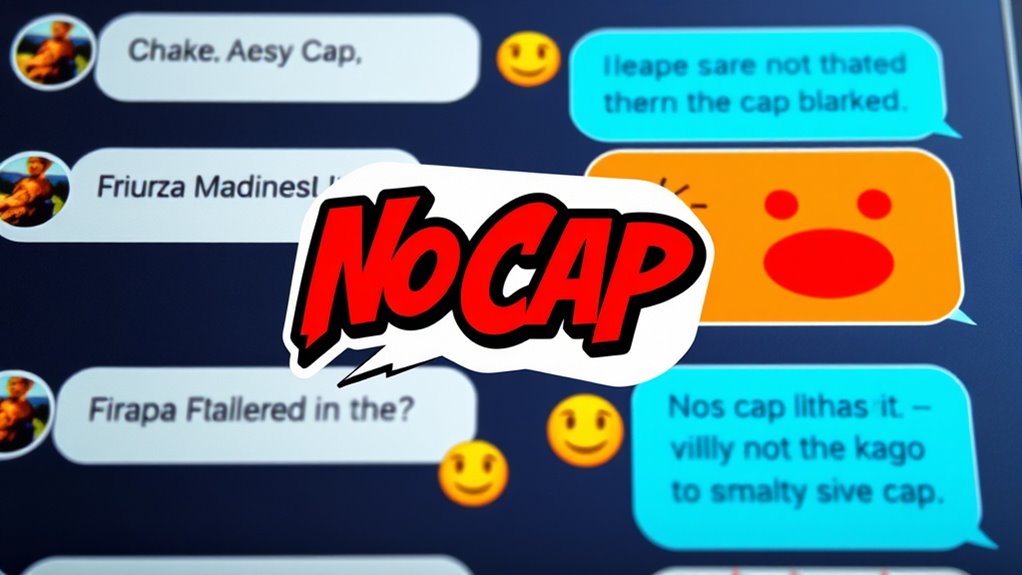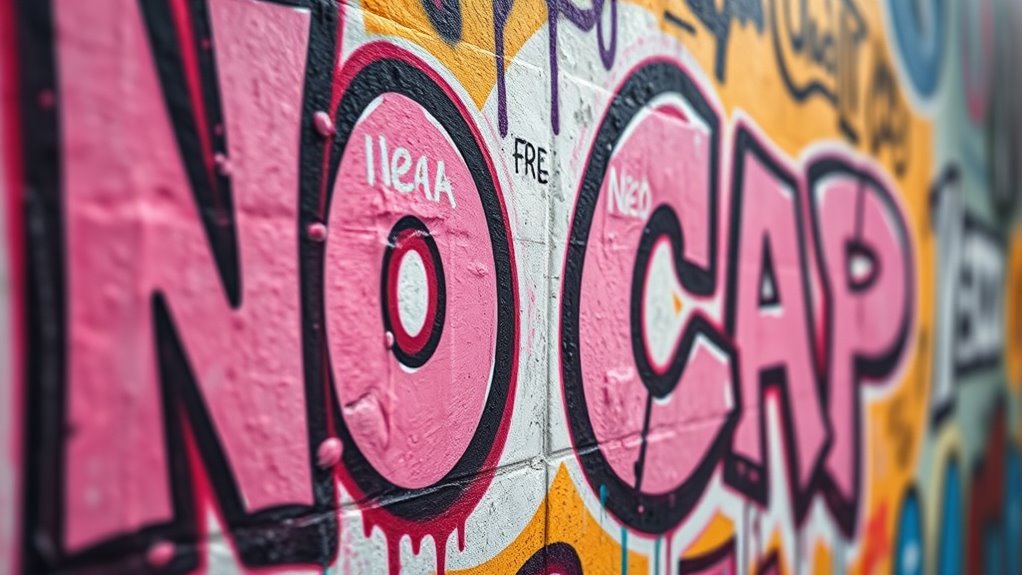In text, “no cap” means you’re being honest or truthful about something. It started in African American Vernacular English and hip-hop culture, where “cap” meant a lie or exaggeration. When someone says “no cap,” they’re emphasizing sincerity or authenticity. This slang has become popular on social media and among younger communities. If you keep exploring, you’ll understand how this phrase reflects cultural shifts and how to use it correctly.
Key Takeaways
- “No cap” means “no lie” or “truthfully,” emphasizing honesty in a statement.
- It originated from African American Vernacular English (AAVE) and hip-hop culture.
- The phrase is used to affirm sincerity or genuine intent in casual conversations.
- “Cap” originally meant lying or exaggeration; “no cap” denies that, indicating truthfulness.
- It is commonly used in social media and online messaging to express authenticity.
The Origin of “No Cap” in Slang

The phrase “no cap” comes from African American Vernacular English (AAVE) and has roots in the early 1900s. It’s part of the ongoing slang evolution, reflecting how cultural slang constantly adapts and spreads within communities. Originally, “cap” was used as slang for a lie or falsehood, and saying “no cap” meant you’re being genuine or truthful. This phrase gained popularity in hip-hop culture and quickly made its way into everyday speech, especially among younger audiences. Its rise highlights how slang can evolve from regional dialects into mainstream language. Today, “no cap” is a common expression that signifies honesty, showcasing the dynamic nature of cultural slang and its ability to shape how we communicate. Understanding the linguistic origins of slang terms like “no cap” can reveal much about cultural identity and social trends.
What Does “Cap” Mean in Modern Language?

When you hear someone say “cap,” they’re usually calling out a lie or falsehood. The term originated in slang to label dishonesty, and it’s now common in everyday conversations and social media. Understanding how “cap” is used can help you recognize when someone is being truthful or not. Additionally, the phrase “no cap” is used to emphasize honesty or sincerity in a statement, indicating that the speaker truly means what they’re saying slang terminology usage.
“Cap” as a Lie
In modern slang, “cap” is often used to call out lies or exaggerations, implying someone isn’t being truthful. When you see someone say “no cap,” they’re asserting honesty, but when “cap” is involved, it signals a lie or falsehood. This usage plays a key role in truthfulness assessment, helping you quickly gauge whether someone’s statement is genuine. As slang evolves, “cap” has become a shorthand for exposing dishonesty, making conversations more direct and expressive. Recognizing this shift allows you to better interpret the intentions behind messages, especially in social media or casual chats. Understanding “cap” as a lie is essential to understanding modern communication, where honesty and deception often coexist in a fast-paced, slang-driven environment. Paying attention to recurring patterns or recognizing and identifying angel numbers in conversations can also help in discerning sincerity and authenticity in communication.
Origins of the Term
The term “cap” in modern slang likely originates from African American Vernacular English (AAVE) and hip-hop culture, where it historically meant to boast or exaggerate. Over time, this slang evolution shifted “cap” from boasting to referring to lies or falsehoods. Its linguistic origins are rooted in the idea of “capping,” which implied exaggeration or dishonesty. As slang spread through social media and youth culture, “cap” became synonymous with lying or fake claims, leading to phrases like “no cap” to mean honesty. Understanding these origins helps you see how language constantly evolves within communities, transforming words into new slang expressions. This evolution illustrates how language shifts to reflect cultural changes and social identities. Today, “cap” and “no cap” serve as succinct ways to communicate authenticity or deception in casual conversations.
Examples in Conversation
You’ll notice “cap” and “no cap” frequently pop up in everyday conversations, especially among friends or on social media. These slang terms are part of the slang evolution, reflecting how modern expressions evolve quickly. For example, someone might say, “That movie was the best, no cap,” meaning they genuinely believe it’s true. Conversely, if someone claims, “I’m the fastest runner, no cap,” they’re asserting honesty. People also use “cap” to call out dishonesty, like, “He said he won the game, but that’s cap.” These examples show how the terms help keep communication honest or playful. As slang evolves, these expressions become common in casual dialogue, making conversations more engaging and authentic among peers.
How “No Cap” Is Used in Conversations

Have you ever wondered how people incorporate “no cap” into their everyday conversations? It’s a prime example of slang evolution, reflecting ongoing urban language trends. When you hear someone say “no cap,” they’re emphasizing honesty or sincerity, often to confirm they’re telling the truth. You might hear this phrase in casual chats among friends or during conversations where trust matters. People typically use it at the beginning or end of a statement, like “That movie was really good, no cap.” Using “no cap” helps keep the tone relaxed and authentic. It’s become a quick way to affirm credibility, fitting seamlessly into the language of younger generations who stay tuned to evolving slang and urban language trends.
Examples of “No Cap” in Social Media Posts

Social media posts often showcase how people incorporate “no cap” to emphasize honesty or authenticity. As slang evolves, “no cap” appears in captions, comments, and stories, aligning with social media trends that prioritize realness. You might see a post like, “This meal was fire, no cap,” highlighting genuine praise. To better understand, here’s an example:
| Post Type | Example Text | Purpose |
|---|---|---|
| Instagram Story | “Just hit a new PR, no cap” | Sharing achievement openly |
| Tweet | “This movie is a masterpiece, no cap” | Expressing honest opinion |
| TikTok Caption | “Vibe was unmatched, no cap” | Authenticity in content |
| Facebook Post | “Made it through the week, no cap” | Relatable honesty |
This usage reflects how slang evolves with social media trends, making “no cap” a popular way to communicate sincerity. Additionally, it often signifies truthful communication, emphasizing the importance of honesty in online interactions.
Comparing “No Cap” With Similar Expressions

While “no cap” emphasizes honesty and authenticity in social media posts, it’s often compared to other slang expressions that serve similar purposes. Slang comparisons highlight how different phrases convey sincerity or truthfulness, like “for real,” “deadass,” or “facts.” These phrase variations are used interchangeably depending on regional preferences or social groups. For example, “deadass” also signals seriousness, while “facts” confirms agreement or truth. Understanding these slang comparisons helps you recognize subtle differences and choose the right expression for context. Although they share a common goal of emphasizing honesty, each phrase carries its own tone and connotation, making it essential to know their nuances for effective communication. Recognizing the contextual differences among these expressions can enhance clarity and authenticity in your interactions.
The Cultural Significance Behind the Phrase

What makes the phrase “no cap” culturally significant is its roots in urban slang and its role in shaping online identity and trust. Over time, slang evolution has propelled phrases like “no cap” from street conversations to mainstream social media, reflecting shifts in communication styles. Its widespread use underscores the cultural influence of youth communities, who prioritize authenticity and honesty in digital interactions. By adopting such slang, you participate in a shared cultural language that fosters connection and credibility. “No cap” exemplifies how slang evolves to mirror societal values, emphasizing sincerity in a digital world full of misinformation. Its significance lies not just in the words themselves but in their power to reinforce cultural bonds and express genuine intent across various platforms. Recognizing the importance of symbolism in language helps explain how phrases like “no cap” resonate emotionally and socially within communities.
Tips for Using “No Cap” Appropriately

To use “no cap” appropriately, you should guarantee it fits naturally within the context of your conversation and is used to genuinely emphasize honesty or truthfulness. Since “no cap” is common in casual speech, avoid overusing it or forcing it into formal situations. Pay attention to the tone and setting; it works best among friends or in relaxed chats. Remember, as slang evolves, so does its acceptance and meaning, so be mindful of your audience. Using “no cap” correctly shows you’re in tune with current slang trends without sounding out of place. Keeping your usage genuine and contextually appropriate ensures your message is clear and authentic, helping you connect better in conversations that reflect the slang evolution. Additionally, understanding the environmental considerations associated with language use can help you communicate more responsibly and effectively.
The Evolution of Slang Terms Like “No Cap”

Slang terms like “no cap” have evolved rapidly, reflecting changes in culture, technology, and communication styles. This linguistic evolution shows how slang adoption shifts quickly among different generations and communities. Over time, phrases like “no cap” move from niche usage to mainstream, shaping everyday conversations. The table below highlights this progression:
| Stage | Key Feature | Example |
|---|---|---|
| Origin | Cultural roots | African American Vernacular |
| Spread | Social media exposure | TikTok, Twitter |
| Mainstream | Widespread recognition | Daily conversations |
This evolution demonstrates how slang adapts and endures, transforming language patterns and reflecting societal changes. Understanding slang evolution reveals how language continually adapts to cultural shifts and technological influences.
Frequently Asked Questions
How Is “No Cap” Different From Saying “Seriously” or “Honestly”?
No cap is a slang term that emphasizes honesty, unlike saying “seriously” or “honestly,” which are more idiomatic expressions. While those words are formal or casual language used to stress sincerity, no cap explicitly means you’re telling the truth without exaggeration or lies. It’s more modern and informal, often used in casual conversations or social media, to show you’re being genuine or serious about what you’re saying.
Can “No Cap” Be Used in Formal or Professional Settings?
You shouldn’t use “no cap” in formal contexts or professional settings because it’s informal slang. It’s not considered appropriate for professional appropriateness, as it can seem too casual or out of place. Stick to more formal expressions like “seriously” or “honestly” to communicate sincerity while maintaining the tone expected in professional or formal conversations. Using slang like “no cap” may undermine your credibility in those environments.
What Are Some Common Misunderstandings About “No Cap”?
You might think “no cap” always means honesty, but misunderstandings happen due to slang evolution and regional usage. Some believe it signals bragging or exaggeration, which isn’t true. Others assume it’s only used among younger people or in specific areas. Remember, slang can shift meaning depending on where you are or who you’re talking to. Clarify context if you’re unsure, since “no cap” primarily emphasizes sincerity in casual conversations.
Is “No Cap” Used Across All Age Groups Equally?
You’ll find that “no cap” isn’t used equally across all age groups. Younger people, especially teens and young adults, use it more often as part of intergenerational language to emphasize honesty. Older generations tend to use it less or not at all, as it’s more popular in modern slang. So, your familiarity with “no cap” might depend on your age or social circles, making it less common outside younger groups.
How Has the Meaning of “No Cap” Changed Over Time?
You might think “no cap” always meant honesty, but its meaning has evolved dramatically. Thanks to slang evolution and social media influence, it now emphasizes genuine truthfulness. Originally, it simply meant “no lie,” but over time, it has become a staple for affirming sincerity in conversations. This shift shows how slang adapts quickly, transforming from a straightforward phrase into a cultural expression that highlights realness in today’s digital age.
Conclusion
Now that you know what “no cap” means and where it comes from, you’ll see how it’s more than just slang—it’s a way to show honesty and authenticity. Some say it started as a way to call out lies, but others believe it’s simply about keeping it real. Either way, using “no cap” correctly can make your conversations and social media posts feel more genuine. So, go ahead and use it confidently—just like you’re telling the truth!









